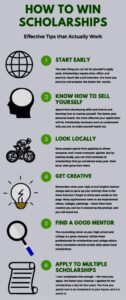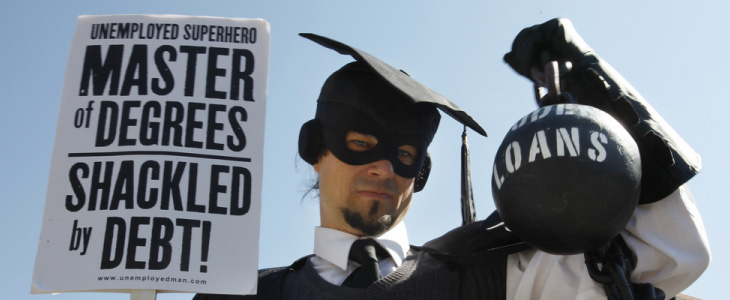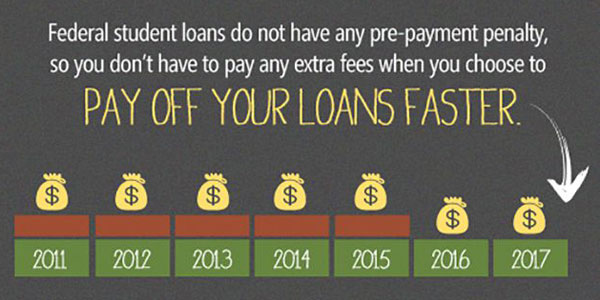What characterizes easy scholarships or “no essay scholarships” other than the obvious fact that it requires minimal application requirements and has easy eligibility requirements? For those pressed for time, easy scholarships should be part of your scholarship application strategy. Scholarships should be used as one of the tools in the financial aid process in order to help fund your higher education and other college or graduate school costs. Also, an added benefit is a low GPA should not deter you away from applying as these easy scholarship applications often don’t look at your grades. These scholarships should be just one step of your scholarship search in addition to applying to both merit, need, field of study and local scholarships (remember to check your local high school counselor pages). Important- you should only be applying to free scholarships and avoid any that ask for any money to apply. Whether you are a high school student, college students or graduate student, we have you covered for your scholarship money needs.
 Our list of 2025 Easy Scholarships:
Our list of 2025 Easy Scholarships:
1) Because College is Expensive Scholarship
Are you a United States citizen and a high school junior or senior, college undergrad, or grad student? Then you can win $500. Nope, no other qualifications. Just be what you already are.
The $500 “Because College is Expensive Scholarship” is open to all students and those planning on enrolling within 24 months. The winner will be determined by random drawing monthly and then contacted directly and announced on the Scholarship Winners page. One entry per person is all that is necessary.
It truly doesn’t get easier than that.
2. ScholarshipPoints $2,500 Monthly Scholarship
ScholarshipPoints is awarding $2,500 in scholarship money each month. Takes less than a minute to enter.
3. $15,000 No Essay Scholarship
Niche is giving away $15,000 to help pay for tuition, housing, books and other college expenses — no essay required! Open to high school, undergrad and grad students.
4. $10,000 Scholarship Contest
Students just need to register for the CollegeXpress Scholarship. You do not need to complete an application for this scholarship. The winner will be chosen in a random drawing process!
5. ScholarshipOwl $50,000 Scholarship
ScholarshipOwl is giving away $50,000 Scholarship money. Just one short form to fill out!
6. $2,000 No Essay Scholarship by Sallie
Sallie will award $2,000 each month to eligible entrants. No essay or account profiles required.
7. $25,000 “Be Bold” Scholarship
Enter the $10,000 “Be Bold” Scholarship no-essay scholarship. It will be awarded to the applicant with the boldest profile.
8. $2,500 Christian Connector Scholarship
The Christian Connector Scholarship, which is worth $2,500! This scholarship is a cinch to apply for and allows students to connect with 80+ colleges and universities that have partnered with the Christian Connector.
9. CampusReel $2,000 Scholarship
Simply register to enter this monthly scholarship. Open to high school juniors & seniors.
10. $1,000 Easy Money Scholarship
The Cappex $1,000 Easy Money Scholarship is a no brainer and offered every month! There is no GPA requirement and no essay to write. In fact, all you have to do is create a profile and fill out what you do in your free time.
11. CollegeVine $2,000 Scholarship
No essay required! Current high school students and college applicants are eligible.
12. $25,000 Path Scholarship
Path is giving one student $25,000 to help pay for tuition, housing, books and other college expenses — no essay required! Open to high school juniors & seniors.
13. $1,500 Offline Mode Scholarship
Open to all students! By taking and sharing the Offline Mode pledge, you could earn a $1,500 scholarship!
14. $1,000 Too Cool to Pay for School Scholarship
If paying for college tuition is not your thing, give this easy scholarship a try! Also, you can check out their no essay scholarships list!
15. $1,000 Survey Sweepstakes
Take short surveys and make some money to help pay for school and books. Easy to enter and complete! Open to students, parents, and recent alumni.
16. Dell Scholars Program
Are you a college-bound high school senior looking for financial assistance to pay off your postsecondary education? If so, consider applying for the Dell Scholars Program!
17. National “Don’t Wait to Reach Your Potential” Scholarship
Award Amount: $500, Scholarship Deadline: January 5
18. Discover Student Loans Scholarship Contest
Award Amount: $500, Scholarship Deadline: January 4
19. Lounge Lizard Web Design Scholarship
Award Amount: $1,000, Scholarship Deadline: February 27 and October 10
20. Create A Greeting Card Scholarship
Award Amount: $10,000, Scholarship Deadline: March 9
21. Frame My Future Scholarship
Award Amount: $5,000, Scholarship Deadline: April 1
22. Forté Future Leaders Scholarship
We’re awarding $10,000 in scholarships this year (multiple deadlines) to help fund your education and launch your career. Available to all undergraduates who identify as women.
23. Direct Textbook Photo Essay Scholarship
Award Amount: $500, Scholarship Deadline: Rolling
24. U.S. Bank Scholarship Program
Award Amount: up to $20,000, Scholarship Deadline: October 30
25. Zombie Apocalypse Scholarship
Award Amount: up to $20,000, Scholarship Deadline: October 30
Bonus: “No Sweat” Scholarship
Award Amount: $2,500, Scholarship Deadline: Quarterly
___________________________________________________________________________
About Easy Scholarships
More than $6.5 billion in scholarships is doled out each year, with 64% of all undergraduate college students receiving at least one grant or scholarship. However, applying for scholarships can be a time-consuming process. With everyones busy schedules, such as keeping up with schoolwork, participating in extracurriculars, and applying for colleges, writing scholarship essays is one more thing on your To Do list.
Entering into easy scholarships are an alternative that allows both high school and college students to quickly apply for these awards, all while still putting their best foot forward. There are plenty of scholarships that don’t require an essay submission as part of the entry requirement. These low-effort scholarships are one of the easiest ways to minimize your need for paying for school with student loans.
The requirements for these types of scholarships are much less time-consuming and offer similar award money. To increase your chances of winning one of these no-essay scholarships, make sure to apply to as many as possible, and in some instances, apply early and often!
To make things easier for you, we’ve assembled this exclusive easy scholarship list. These scholarships change frequently so be sure to check back in regularly!
 How to Find Easy Scholarships to Apply For
How to Find Easy Scholarships to Apply For
You can browse through all of the scholarships currently available on the above list, or you can use a scholarship search engine, like Accessscholarships.com, to pull up scholarships that are relevant to your major, hobbies, or personal identity. Be sure to put in as much information about yourself as possible to help you chances in both finding a winning those scholarships!
When to Start Applying for Easy Scholarships
On Cedaredlending.com, there are easy scholarships available for students at all levels of education, so there’s no need to wait until you are accepted or attending college to start your search for financial aid. Many students start their search as high school seniors, but you can begin applying for easy scholarships at any point in high school, but generally speaking, there are more scholarships avaibale to upperclassmen.
However, it’s never too late to begin finding scholarships. Whether you’re an undergraduate or graduate student, there are easy scholarships designed just for you. Start applying as soon as possible so you can maximize your chances of winning easy scholarships.
What to Consider When Applying for Scholarships
It can feel like you have no control over your chances of winning when you apply for an easy scholarship since many don’t allow for the personal touch of an essay or any other application materials.
However, don’t get discouraged if you haven’t won an easy scholarship yet, as there are many ways to increase your chances of winning. There are new easy scholarships created every month, so keep an eye out for any new opportunities.
Frequently asked questions about easy scholarships
Are there any drawbacks to applying for easy scholarships?
The biggest downside of applying for easy scholarships is that many students can enter. This means that your chances of winning are lower than scholarships with essays and other specific criteria. The truth is that many of these scholarships are more similar to contests than a “true” scholarship competition based on merit or an essay.
Can I improve my chances at winning an easy scholarship?
Generally, these is no additional effort to help you win an easy scholarship other than applying when additional entry dates become available. They are dissimilar to a traditional scholarship where perhaps you can write “better” essay or perhaps have someone proofread your application.
What is the best strategy for applying for easy scholarships?
We suggest that you apply to as many scholarships as possible, both easy and traditional. However, given that easy scholarships are more difficult to secure, you should cast a wide net and also apply to scholarships with more specific criteria which applies to you (bonus- there will be less competition).
Bottom line for applying to these quick and easy scholarships:
Easy scholarships should not be your only focus when applying for scholarships. Just be sure that you are also applying to other scholarships with more specific and substantial criteria. Statistically, these scholarships may prove easier to attain, because there are less applicants and the candidate may be a perfect fit for that specific scholarship criteria.
Easy scholarships are appealing due to the obvious fact that it requires minimal application process. For those in a time crunch, seeking rewards for past accomplishments, current talents, and passionate interests, easy scholarships are a practical choice. Scholarships already provide free money for tuition, but easy scholarships go farther in helping this process even easier. Whether the award is $25 or $5,000, any monetary amount is worth the token effort. Hopefully, the process will also be enjoyable, and you will have a good chance at winning scholarships you find effortless. All of your personal demographics and interests go into determining what makes a scholarship contest not only worth entering, but something you would consider attainable.
___________________________________________________________________________
Before reaching out for student loans, exhaust all possible resources. We have given you some easy ones to think about and should take advantage of.
If you strike out on these easy scholarships, remember to exhaust your federal student loans first before turning to private students loans. Check out Cedar Ed Private student loans for quick and easy loan comparisons.

 SoFi also offers additional benefits to its borrowers. For example, with unemployment protection, if you lose your job while you still have a student loan balance, SoFi will temporarily pause your payments and even assist you in finding a new job by reviewing your resume, as well as offering you interview coaching and various tactics for negotiating, which can help you to get back on your “financial feet” more quickly.
SoFi also offers additional benefits to its borrowers. For example, with unemployment protection, if you lose your job while you still have a student loan balance, SoFi will temporarily pause your payments and even assist you in finding a new job by reviewing your resume, as well as offering you interview coaching and various tactics for negotiating, which can help you to get back on your “financial feet” more quickly. This means that rather than just evaluating your past financial and credit history, they also look forward and take into consideration your future financial potential and responsibility. This makes their loan underwriting that much more personal.
This means that rather than just evaluating your past financial and credit history, they also look forward and take into consideration your future financial potential and responsibility. This makes their loan underwriting that much more personal. There are no hidden fees to contend with such as application fees, origination fees, or even prepayment penalties if you pay your loan off early. You are also protected from various financial “emergencies” such as job loss. For example, if you lose your job, CommonBond will pause your student loan payments – and will even assist you in finding new employment.
There are no hidden fees to contend with such as application fees, origination fees, or even prepayment penalties if you pay your loan off early. You are also protected from various financial “emergencies” such as job loss. For example, if you lose your job, CommonBond will pause your student loan payments – and will even assist you in finding new employment. These can include automatic payments, which is when you authorize the Citizens Bank loan servicer to automatically deduct your monthly loan payments, you can save 0.25% off your student loan’s interest rate. Or a loyalty discount, which applies if you (or a cosigner) already has a qualifying account with Citizens Bank at the time that you apply, you may also be able to save 0.25% on a new Education Refinance Loan.
These can include automatic payments, which is when you authorize the Citizens Bank loan servicer to automatically deduct your monthly loan payments, you can save 0.25% off your student loan’s interest rate. Or a loyalty discount, which applies if you (or a cosigner) already has a qualifying account with Citizens Bank at the time that you apply, you may also be able to save 0.25% on a new Education Refinance Loan. Because of the transparent, low-interest lending structure of these types of financial institutions, you can make smart borrowing decisions when it comes to consolidating or refinancing your student loans through
Because of the transparent, low-interest lending structure of these types of financial institutions, you can make smart borrowing decisions when it comes to consolidating or refinancing your student loans through  Through this lender, you may be able to refinance up to 100% of your outstanding federal and private student loans. There are no origination fees, and no prepayment penalties if you pay off your loan early.
Through this lender, you may be able to refinance up to 100% of your outstanding federal and private student loans. There are no origination fees, and no prepayment penalties if you pay off your loan early.




